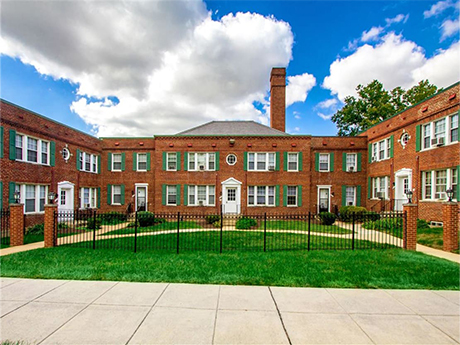WASHINGTON, D.C. — In 2019, the Metropolitan Washington Council of Governments issued a report stating that the D.C. region — comprising the city, Northern Virginia and suburban Maryland — needed to add 320,000 more housing units between 2020 and 2030, and that at least 75 percent of this new housing should be affordable to low- and medium-income households.
Rob Fossi, senior vice president of real estate development at Enterprise Community Development, says the figure has only climbed in recent years due to macroeconomic and local challenges.
“In the three years since that report was issued, this demand has only intensified while supply chain interruptions, interest rate spikes and competing resource challenges precipitated by the COVID-19 pandemic have all been challenges to maintain pace,” says Fossi.
Enterprise Community Development, an affiliate of Enterprise Community Partners, is the top nonprofit owner and developer of affordable homes in the Mid-Atlantic with a portfolio spanning about 13,000 apartments that house more than 22,000 residents. The firm is actively developing and preserving affordable housing across the region in order to address the demand, which Fossi says shows no signs of abating anytime soon.
“There is little doubt that the demand for quality affordable housing will intensify and expand,” says Fossi. “Our response is to double-down on markets in which we are heavily invested, while also exploring less familiar markets where our combination of mission, capacity and resourcefulness might serve an unmet need for residents, communities and stakeholders.”
Fossi recently spoke with REBusinessOnline.com about his firm’s recent business activity, as well as the state of the affordable housing sector in the greater D.C. region. The following is an edited interview:
REBusinessOnline: How do you see the rising rates of inflation and interest rates helping or hindering the affordable housing sector?
Rob Fossi: Affordable housing has traditionally been something of a safe harbor in times of economic upheaval as market-rate transactions become less desirable, and such times tend to create even greater demand from a growing population in need. These pressures can also trigger additional public sector support. While this can certainly boost production in the short term, the cascading challenges experienced by the majority of our fellow citizens who are already living paycheck-to-paycheck may make this seem like a pyrrhic victory.
REBO: Nationally speaking do you think the messaging is easier now for your firm’s pursuit to create and preserve affordable housing? In other words, are your financial partners more familiar with the product type than in years past?
Fossi: The affordable housing industry is a critical component in the fabric of the American economy, served by a wide range of professionals. It is increasingly a hotbed for innovation and also includes aggregators, associations and advocates. It is a platform that can support significantly greater productivity but what’s needed is additional resourcing and prioritization on the national agenda.
REBO: Enterprise recently acquired Skyland Apartments, a NOAH (naturally occurring affordable housing) project comprising 224 apartments in Southeast D.C.’s Randle Heights submarket. What drew your firm to this community when it came to market, and how did the company separate itself from the competition during the TOPA (Tenant Opportunity to Purchase Act) process, which began before the pandemic?
Fossi: Enterprise Community Development first met with residents in February 2020 to discuss its approach to partnering with them to continue providing quality affordable housing at Skyland Apartments. The COVID-19 pandemic’s outbreak in March 2020 led to the suspension of TOPA timelines. The District resumed TOPA timelines in August 2021, and the tenant association restarted its competitive process to select a partner, culminating in the selection of Enterprise Community Development. Working with residents to preserve long-term affordability in properties at risk for conversion to market is a particular competency and priority for Enterprise, which may well have been a factor in our selection by the residents.
REBO: Enterprise is focusing on the property’s rehabilitation in collaboration with residents to keep units affordable going forward. What all does that entail and are you bringing on equity or debt partners to make that happen?
Fossi: It entails a lot but begins with the process of getting to know each resident, listening and learning to understand particular challenges and aspirations, and working collaboratively to arrive at a renovation and/or redevelopment program that best serves their long-term goals. As that resident engagement campaign unfolds, we will certainly begin engaging with lenders and investors to understand which products and programs will best serve the priorities that we collectively agree upon with residents, stakeholders and the broader community.
REBO: Can you share how the region’s housing authorities are helping firms such as Enterprise address supply issues for affordable housing?
Fossi: The Mid-Atlantic Region generally, and the DMV (D.C.-Maryland-Virginia) specifically, has become a launching pad for the most accomplished, productive and innovative affordable and mixed-income developers in the country. It is certainly no coincidence that some of the most adept and accomplished local and state housing agencies also call this region home and have responded with a range of resources and policies supporting production and preservation that continually set and reset the bar.
REBO: What’s next for your firm in the Mid-Atlantic?
Fossi: We have launched our Let’s Build Accelerator initiative, a companion to Enterprise Community Partner’s Equitable Path Forward, as one component of our commitment to address systemic racial inequity. We expect to announce our first joint venture partnerships with BIPOC developers in Baltimore and the District in the coming months. We also have several closings projected in the next two years in both markets with units produced and/or preserved expected to exceed 1,000.



